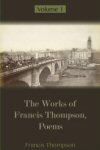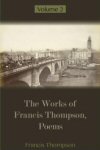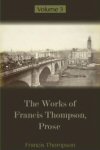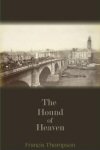The Works of Francis Thompson (4 vols.)
Digital Logos Edition
Overview
Francis Thompson lived a life as dramatic as his poetry. His father was a doctor, and he came from a Catholic family. He was educated at Ushaw, but after failing to follow in his father’s footsteps as a doctor, Thompson moved to London and lived for three years as a destitute and homeless vagabond. He attempted to make money through bookselling, shoemaking, selling matches, and calling cabs. He was also a recipient of patronage from a wealthy couple. Upon writing and submitting a small poem for publication, Thompson’s literary career took off and he was able to leave the streets and an opium addiction that had wrecked his health.
Professional relationships, friends, and a period of time at Premonstratensian monastery inspired him to produce “Daisy” and the magnificent “Ode to the Setting Sun”. He made some impact on the literary world during his life, but his literary prowess was most fully recognized after his death. This collection contains his entire body of work, including pen and ink illustrations for The Hound of Heaven. This shining light of Christian intellect and non-traditional devotional fervor left a small and impactful collection of poems and prose. His relationship to the church is ever present in his spiritual and observational writings. Take a journey into the mind of a poet who was daily reminded of God’s pursuit of his soul.
For more poetry, check out the Select Works of Percy Bysshe Shelley (7 vols.).

Key Features
- Contains poems, prose and illustrations
- Focuses on spiritual and poetic themes
- Examines an idealized heart of Christian devotion
Praise for the Print Edition
The interest aroused by Thompson is as strongly religious as it is literary.
—Current Opinion, Volume 56
Product Details
- Title: The Works of Francis Thompson
- Author: Francis Thompson
- Volumes: 4
- Pages: 805
- Resource Type: Collected Works, Poetry
- Topic: Spirituality

This first volume of a three-volume series contains the poetry of Francis Thompson, whose posthumous reputation grew because of his highly imaginative style. This particular book contains his well-known poem “Daisy” and “Ode to a Setting Sun”. His themes include nature and Christian imagery, engaging the emotive as well as intellectual side of his readers.

This second volume of Francis Thompson’s poetry continues the general focus of the first volume: life as a Catholic and focusing on the beauty of God found within the world. This volume contains the poem “Mistress of Vision”. Gain an increased awareness of the power of poetry to unlock the heart in Christian devotion with Francis Thompson.
Who, with the “Mistress of Vision” before him, will say that the contemplative, ascetic and mystical ideals of the Church are effete and hopelessly outgrown?
—Paschal Scotti, Out of Due Time: Wilfrid Ward and the Dublin Review

This volume contains Francis Thompson’s prose. Noted inclusions are his celebrated description of the life and work of Percy Bysse Shelley, an essay entitled “Paganism, Old and New” in which the author comments on his own cultural setting, and “In Darkest England”. Readers will benefit from Thompson’s delightful turns of phrase and insight into his own cultural milieu.

Filled with striking pen and ink illustrations, this edition of Hound of Heaven provides visual imagery alongside the written imagery in this poem. These 187 lines are the source of much of Francis Thompson’s highly esteemed reputation. The Hound of Heaven depicts God pursuing Thompson’s soul with divine love, and the popularity of this poem is evidence of its subject matter hitting the mark.
The name is strange. It startles one at first. It is so bold, so new, so fearless. It does not attract, rather the reverse. But when one reads the poem this strangeness disappears. The meaning is understood. As the hound follows the hare, never ceasing in its running, ever drawing nearer in the chase, with unhurrying and imperturbed pace, so does God follow the fleeing soul by His Divine grace.
—The Neumann Press Book of Verse, 1988
About Francis Thompson
Francis Thompson (1859–1907), was an English poet and literary critic. His father was a doctor, and he came from a Catholic family. He was educated at Ushaw, but failed to follow in his father’s footsteps as a doctor. Thompson moved to London and lived for three years as a destitute and homeless vagabond. He attempted to make money through bookselling, shoemaking, selling matches, and calling cabs. He was also a recipient of patronage from a wealthy couple. Upon writing and submitting a small poem for publication, Thompson’s literary career took off and he was able to leave the streets and an opium addiction that had wrecked his health. Upon his death, G.K. Chesterton commented, “we lost the greatest poetic energy since Browning.”
Reviews
2 ratings

Forrest Cole
11/9/2021
